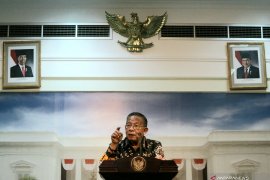Therefore, when the prices of commodities drop, it affects the income of Indonesian people."Jakarta (ANTARA News) - The decline in the prices of commodities worldwide has significantly reduced the income and consumption of Indonesians, Chairman of the Association of Indonesian Economists Darmin Nasution said.
The situation is clear in regions outside Java where economies rely on exports of commodities and raw materials, he stated during a gathering dubbed "Meeting with Business Community Members: President Answers Economic Challenges" here on Thursday.
"The prices of commodities have considerable affects on people in Kalimantan and Sumatra. We also recorded negative growth in exports of mining products in several regions, including Riau and East Kalimantan," he pointed out.
According to Nasution, Indonesia felt strong negative impacts because since 2006, business and industrial sectors have greatly relied on exports of commodities rather than improving domestic manufacturing industries.
"Therefore, when the prices of commodities drop, it affects the income of Indonesian people," the former central bank governor explained.
Nasution further noted that due to this decline in the prices of goods, domestic consumption, both public and private, had decreased.
Quoting statistics of Bank Indonesia, he added that consumption of the business sector and the public had dropped, as reflected by a red indicator in the sale of cement, which is an industrial raw material, and the sale of motor vehicles.
When the domestic economy continues to witness a downward economic trend, the public and business community expect intervention from the government, he remarked.
It is also undeniable that the realization of programs funded by the 2015 budget has been slow, as a result of which efforts to tackle the global economic slowdown have not been as effective, Nasution observed.
"Budget spending by the Ministry of Public Works and Public Housing and the Ministry of Transportation are still below those recorded last year, while the high tax income target has yet to be met," the economist added.
The realization of the central governments budget spending was recorded at 33.1 percent in the first semester of 2015. While the economic growth target was set at 5.7 percent, in line with the revised 2015 budget, the growth recorded in the first quarter was only 4.71 percent.
In addition, Nasution stressed that international financial institutions had revised down their projection of Indonesias economic growth due to continuing global economic slowdown and low realization of economic growth in the first quarter.
(Reporting by Indra Arief Pribadi/Uu.H-YH/INE/KR-BSR/A014)
Editor: Priyambodo RH
Copyright © ANTARA 2015












